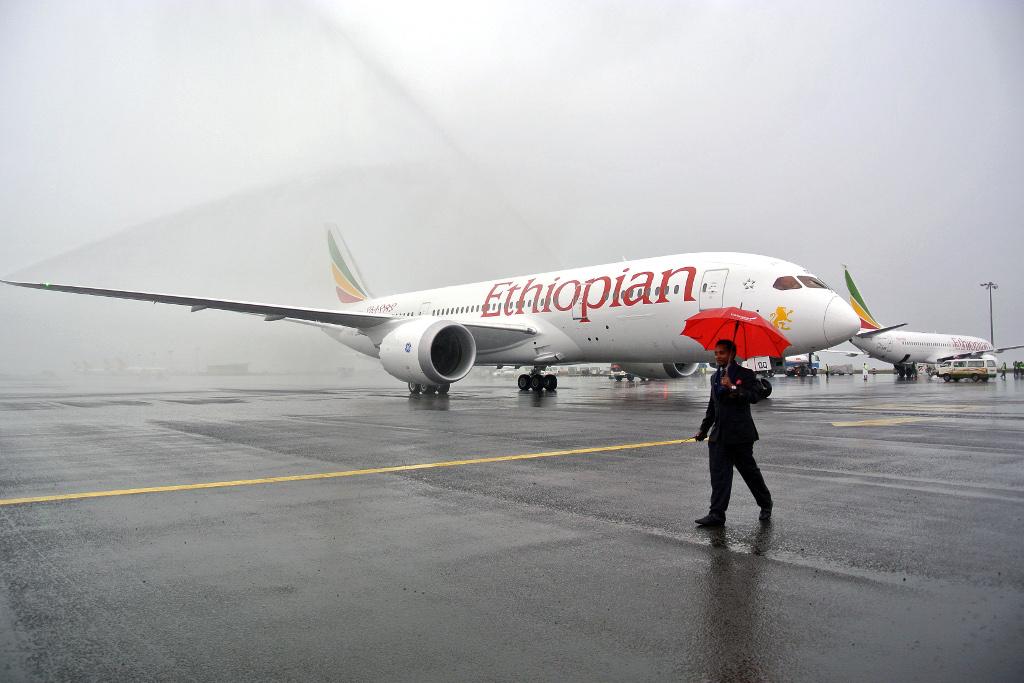Is this the end of expensive air travel in Africa?
A Boeing 787 Dreamliner is hosed down on arrival in Addis Ababa on August 17, 2012.
JOHANNESBURG, South Africa – An upstart airline may be the first pan-African carrier to bring affordable flights to a continent known for its bad roads and prohibitively expensive air travel.
African economies are booming, but getting around can be a nightmare. In addition to poor road infrastructure, passenger trains are few, and flights can be costly, with scant inter-African connections. A short flight to a neighboring country can cost upwards of $1,000. Oftentimes, it's easier to travel via Paris or Lisbon.
Yet Fastjet, a low-cost airline that currently operates only domestic routes in Tanzania, sees a market in Africa for budget flights that would serve a wider population. Next month, the airline will begin offering cheap flights between Johannesburg and Cape Town in South Africa. It also has plans to expand into Kenya, Ghana and Angola.
In another new venture, China’s Hainan Airlines has teamed up with low-cost carrier Africa World Airlines, based in Ghana. The airline last year launched flights on domestic routes, and also plans to expand to regional destinations such as Abidjan in Ivory Coast and Lagos in Nigeria.
This could mark the beginning of a new trend in budget airline travel on the continent, even as investment regulations, high costs, and safety concerns stymie industry growth.
“As populations grow and disposable income and consumer spending increases, there is greater demand for affordable air travel,” Fastjet chairman David Lenigas said in a statement. “We would like to be part of the solution.”
More from GlobalPost: For Margaret Thatcher, few tears shed in South Africa
Right now, only 10 percent of Africans currently travel by air, according to the African Development Bank. But with rapid economic growth and an emerging middle class in many countries, demand is expected to boom.
Tourism to Africa is also growing, with more than 9 million tourists visiting South Africa in 2012, a 10.2 percent jump from 2011 — and more than double the average global growth rate.
More broadly, the International Air Transport Association has forecast Africa's total air traffic to hover at just above 6 percent yearly growth for the next two years, slightly above the world average.
“If a small businessman in Accra finds that the time it takes for him to attend a meeting in N’Djamena is cut by three-quarters, and that the cost is reduced by two-thirds, his market footprint will expand and his trade will thrive,” Africa World Airlines said on its website.
But while the demand is there, investment caps and other industry regulations will make it difficult for Fastjet and other budget airlines to get off the ground.
African governments have largely failed to invest in air travel as a key part of their economies, aviation industry experts say. Plus, bilateral agreements protect state-owned airlines that are sometimes seen as cash cows for African governments. The pacts regulate not only air carriers, but also the frequency of flights on routes between African countries and even the types of planes.
Rules that limit foreign investment in the industry — often capping it at 25 percent — are also stunting airline growth here, according to Linden Birns, aviation specialist and managing director of the South Africa-based public relations firm, Plane Talking.
In fact, Fastjet ran into investment trouble at first. It initially planned to take over the recently bankrupted South African budget carrier 1time, but the move fell through due to limits on foreign investment. Instead, it has gone into business with local investors, one of whom is President Jacob Zuma’s businessman son, Edward.
More from GlobalPost: Keeping up with the Mandelas
“Government policies in Africa tend to see aviation as an ‘elite’ product, rather than as a critical component of the continent’s economic infrastructure,” Tony Tyler, head of the International Air Transport Association, said in an address to the Cape Town Press Club last week.
Indeed, unlike in Europe and North America, full-service economy class, including meals and alcoholic drinks, is standard on most flights in Africa.
Tack on the astronomical cost of jet fuel — which on average is 21 percent more expensive in African countries due to taxes — and all of this leads to higher ticket costs for passengers. For new budget air carriers that seek to break into the pan-African market, these regulations and high prices will be part of the challenge.
Right now, Fastjet is offering no frills service, with charges for snacks and drinks — the standard travel experience for most budget travellers in North America or Europe, but new in much of Africa. The airline, which is partly owned by Sir Stelios Haji-Ioannou, founder of the UK budget carrier easyJet, is betting on its low-ticket prices luring travellers on key routes.
For example, a Fastjet flight between Tanzania’s main city Dar es Salaam and Kilimanjaro can cost as little as $65 including taxes, compared to $308 on a rival airline.
Africa World Airlines, like Fastjet, is chasing customers by offering cheap tickets and better flight routes.
“If today you really want to grow your economy, you need to have good connectivity,” Birns said.
And according to the African World Airlines website, “Aviation is the foundation on which Africa’s economic miracle will be built.”
The story you just read is accessible and free to all because thousands of listeners and readers contribute to our nonprofit newsroom. We go deep to bring you the human-centered international reporting that you know you can trust. To do this work and to do it well, we rely on the support of our listeners. If you appreciated our coverage this year, if there was a story that made you pause or a song that moved you, would you consider making a gift to sustain our work through 2024 and beyond?
